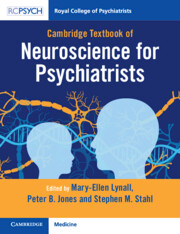Book contents
- Cambridge Textbook Of Neuroscience for Psychiatrists
- Reviews
- Cambridge Textbook of Neuroscience for Psychiatrists
- Copyright page
- Contents
- Contributors
- Introduction
- 1 Cells
- 2 Neurotransmitters and Receptors
- 3 Basic Techniques in Neuroscience
- 4 Neuroanatomy
- 5 Neural Circuits
- 6 Modulators
- 7 Genetics
- 8 Neurodevelopment and Neuroplasticity
- 9 Integrated Neurobiology of Specific Syndromes and Treatments
- 9.1 Autism
- 9.2 Attention Deficit Hyperactivity Disorder
- 9.3 Drug Use, Addiction, Tolerance, Withdrawal and Relapse
- 9.4 Anxiety Disorders
- 9.5 Post-Traumatic Stress Disorder
- 9.6 Obsessive–Compulsive and Related Disorders
- 9.7 Major Depressive Disorder
- 9.8 Bipolar Affective Disorder
- 9.9 Psychosis
- 9.10 Schizophrenia
- 9.11 Borderline Personality Disorder
- 9.12 Self-Harm and Suicidality
- 9.13 Medically Unexplained Symptoms
- 9.14 Delirium
- 9.15 Perinatal Disorders
- 9.16 Sleep Disorders
- 9.17 Eating Disorders
- 9.18 Epilepsy and Seizures
- 9.19 Electroconvulsive Therapy
- 9.20 Brain Stimulation
- 10 Neurodegeneration
- Index
- References
9.14 - Delirium
from 9 - Integrated Neurobiology of Specific Syndromes and Treatments
Published online by Cambridge University Press: 08 November 2023
- Cambridge Textbook Of Neuroscience for Psychiatrists
- Reviews
- Cambridge Textbook of Neuroscience for Psychiatrists
- Copyright page
- Contents
- Contributors
- Introduction
- 1 Cells
- 2 Neurotransmitters and Receptors
- 3 Basic Techniques in Neuroscience
- 4 Neuroanatomy
- 5 Neural Circuits
- 6 Modulators
- 7 Genetics
- 8 Neurodevelopment and Neuroplasticity
- 9 Integrated Neurobiology of Specific Syndromes and Treatments
- 9.1 Autism
- 9.2 Attention Deficit Hyperactivity Disorder
- 9.3 Drug Use, Addiction, Tolerance, Withdrawal and Relapse
- 9.4 Anxiety Disorders
- 9.5 Post-Traumatic Stress Disorder
- 9.6 Obsessive–Compulsive and Related Disorders
- 9.7 Major Depressive Disorder
- 9.8 Bipolar Affective Disorder
- 9.9 Psychosis
- 9.10 Schizophrenia
- 9.11 Borderline Personality Disorder
- 9.12 Self-Harm and Suicidality
- 9.13 Medically Unexplained Symptoms
- 9.14 Delirium
- 9.15 Perinatal Disorders
- 9.16 Sleep Disorders
- 9.17 Eating Disorders
- 9.18 Epilepsy and Seizures
- 9.19 Electroconvulsive Therapy
- 9.20 Brain Stimulation
- 10 Neurodegeneration
- Index
- References
Summary
Delirium presents with a clearly operationalised acute confusional state caused by an underlying neurophysiological disturbance. However, despite the tremendous public health significance of delirium, much of its underlying pathophysiology remains theoretical.
- Type
- Chapter
- Information
- Cambridge Textbook of Neuroscience for Psychiatrists , pp. 497 - 508Publisher: Cambridge University PressPrint publication year: 2023

